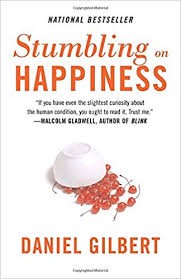Stumbling on Happiness

There’s a good chance that things you think will make you happy, won’t —this is the premise of Stumbling on Happiness by Dan Gilbert. It was one of the most well-written and funny books I read in 2017. It can teach you a fair bit about psychology if you’re a complete beginner (like I was), and is a fairly interesting read, but it’s the writing style that wins it for me. To give you a flavor, the book is full of gems like these:
“Psychologists call this habituation, economists call it declining marginal utility, and the rest of us call it marriage.”
Or this one:
“My friends tell me that I have a tendency to point out problems without offering solutions, but they never tell me what I should do about it.”
Here are the main ideas discussed in the book:
Prospection
The human brain is an “anticipation machine” and prospection, or “making future” is the most important thing it does. Later in the book, we will get to the three flaws of our imagination that lead us to predict this future poorly: in particular what makes us happy.
Subjectivity
In this part, Dan tries to define what it is exactly we are going after. What does happiness even mean? How can we hope to achieve a solid, scientific answer to questions about a feeling? Happiness is a subjective experience that is difficult to describe to ourselves and to others. Conjoined twins think they are happy too, but anyone not in their situation won’t agree with them.
Onto flaws of our imagination, or say, our cognitive biases that lead us to stumble on happiness:
Flaw #1: Realism
We use our eyes to look into space, and our imaginations to look into time. Quite often, our imaginations lead us to foresee things as they will not be. Our imagination works so quickly, quietly and effectively that we are insufficiently skeptical of its products.
Flaw #2: Presentism
Imagined futures (and pasts) are more like the present than they actually will be (or were). Our imagination’s products are not particularly imaginative after all. We assume that what we feel as we imagine the future is what we’ll feel when we get there, but in fact, what we feel as we imagine the future is often a response to what’s happening in the present. Similarly, our interpretations of the past are heavily influenced by our present.
Flaw #3: Rationalization
Imagination has a hard time telling us how we will think about the future when we get there. The psychological immune system will make bad things feel not so bad as they are imagined to feel.
So what can we do about it? Not much really:
Corrigibility
We are incorrigible when it comes to remedying our illusions of foresight by personal experience, or by wisdom we inherit. Something we can attempt to do: use other people’s experiences to predict the future, instead of imagining it. It’s a simple remedy that we find extremely hard to accept, and almost never do. It’s surprising how similar people are in much of their experiences.
A word of warning: if you have read any text on psychology, you won’t find this book interesting in terms of learning anything new. You should still read it purely for the great writing style, and maybe as a lesson on how to convey complex ideas in a very simple language understandable by almost anyone.
This is #5 in a series of book reviews published weekly on this site.
